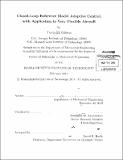Closed-loop Reference Model adaptive control : with application to very flexible aircraft
Author(s)
Gibson, Travis Eli
DownloadFull printable version (9.586Mb)
Alternative title
CRM adaptive control : with application to VFA
Other Contributors
Massachusetts Institute of Technology. Department of Mechanical Engineering.
Advisor
Anuradha M. Annaswamy.
Terms of use
Metadata
Show full item recordAbstract
One of the main features of adaptive systems is an oscillatory convergence that exacerbates with the speed of adaptation. Over the past two decades several attempts have been made to provide adaptive solutions with guaranteed transient properties. In this work it is shown that Closed-loop Reference Models (CRMs) can result in improved transient performance over their open-loop counterparts in model reference adaptive control. In addition to deriving bounds on L-2 norms of the derivatives of the adaptive parameters which are shown to be smaller, an optimal design of CRMs is proposed which minimizes an underlying peaking phenomenon. The analytical tools proposed are shown to be applicable for a range of adaptive control problems including direct control, composite control with observer feedback and partial states accessible control. In addition a detailed study of the applicability of CRM adaptive control to very flexible aircraft is presented. Following the NASA Helios flight mishap in 2003 there has been a push for greater understanding of the aerodynamic-structural coupling that occurs in light, very flexible, flying wings. Previous efforts in that direction revealed that the flexible aircraft had instability in the phugoid mode for large dihedral angles and that including the flexible dynamics was necessary to arrive at an appropriate trim condition. In this thesis, we show how these large dihedral excursions can occur in the presence of turbulence, by constructing an overall nonlinear model that captures the dominant dynamics of a very flexible aircraft. The thesis closes with the application of CRM adaptive control to the VFA model.
Description
Thesis: Ph. D., Massachusetts Institute of Technology, Department of Mechanical Engineering, 2014. Cataloged from PDF version of thesis. Includes bibliographical references (pages 187-192).
Date issued
2014Department
Massachusetts Institute of Technology. Department of Mechanical EngineeringPublisher
Massachusetts Institute of Technology
Keywords
Mechanical Engineering.